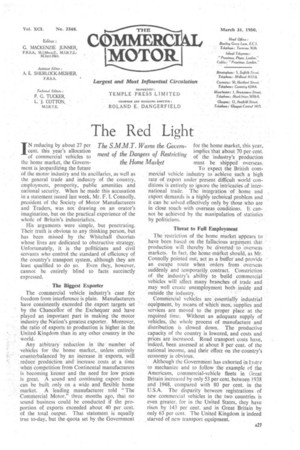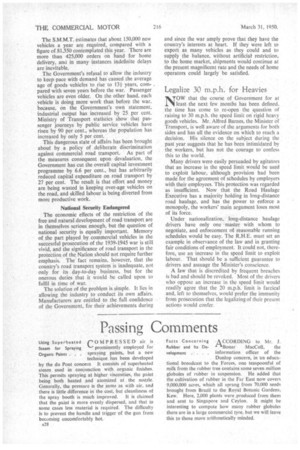The Red Light
Page 29

Page 30

If you've noticed an error in this article please click here to report it so we can fix it.
IN reducing by about 27 per cent. this year's allocation of commercial vehicles to the home market, the Government is jeopardizing the future of the motor industry and its ancillaries, as well as the general trade and industry of the country, employment, prosperity, public amenities and national security. When he made this accusation in a statement issued last week, Mr. F. I. Connolly, president of the Society of Motor Manufacturers and Traders, was not drawing on an orator's imagination, but on the practical experience of the whole of Britain's industrialists.
• His arguments were simple, but penetrating. Their truth is obvious to any thinking person, but has been missed by the Whitehall theorists whose lives are dedicated to obstructive strategy. Unfortunately, it is the politicians and civil servants who control the standard of efficiency of the country's transport system, although they are least qualified to do so. Even they, however, cannot be entirely blind to facts succinctly expressed.
The Biggest Exporter The commercial vehicle industry's case for freedom from interference is plain. lvfanufacturets have consistently exceeded the export targets set by the Chancellor of the Exchequer and have • played an important part in making the motor industry the Nation's greatest exporter. Moreover, the ratio of exports to production is higher in the United-Kingdom than in any other country in the world.
Any arbitrary reduction in the number of vehicles for the home market,. unless entirely ' counterbalanced by an increase in exports, will reduce production and increase costs at a time when competition from Continental manufacturers is becoming keener and the need for low prices is great. A sound and continuing export trade can be built only on a wide and flexible home market. A leading manufacturer told "The Commercial Motor," three months ago, that no sound business could be conducted if the proportion of exports exceeded about 40 per cent. of the total output. That statement is equally true to-day, but the quota set by the Government for the home Market, this year, implies that about 70 per cent. of the industry's production must be shipped overseas. To'expect the British commereial Vehicle industry to U.Chieve such a high rate 'of export under present difficult world coriditiorisiS entirely to ignore the intricacieS of international trade. The integration Of home and export demands is a highly technical problem and it can be solved effectively only by those who are in close touch with overseas conditions. It cannot be achieved by the manipulation of statistics by politicians.
Threat to Full Employment The restriction of the home niarket appears to have been based on the fallacious 'argument that ' production will thereby be diverted to oVerseas markets. In fact, the home market should, as Mr. Connolly. pointed out act as a buffer and provide an escape route when 'orders from overseas suddenly and temporarily. contract. -Constriction of the industry's ability to build commercial vehicles will affect 'many branches of trade and may well create unemployment both inside and outside the industry. • Commercial vehicles are essentially industrial equipment, by means of Which men, 'supplies and services are moved to the proper place at the required time. Without an adequate supply of vehicles, the whole process of manufacture and distribution is slowed down. The productive capacity of the country is lowered, and costs and prices are increased. Road transport costs have, 'indeed, been assessed at about 8 pet-cent. of the national income, and their effect on the-country's economy is obvious.
Although the Government has exhorted int.:13En/ ' to mechanize and to follow 'the' example of the Americans, commercial-vehicle fleets in Great Britain increased by only 53 per cent. between 1938 and 1948, compared with 80 per cent. in the U.S.A. The disparity between registrations of new commercial vehicles in the two countries is even greater, for in the United States, they have risen by 143 per cent, and in Great Britain by only 63 per cent. The United Kingdom is indeed . starved of new transport equipment. The S.M.M.T. estimates that about 150,000 new vehicles a year are required, compared with a figure of 81,550 contemplated this year. There are more than 425,000 orders on hand for home delivery, and in many instances indefinite delays are inevitable.
The Government's refusal to allow the industry to keep pace with demand has caused the average age of goods vehicles to rise to l3i years, compared with seven years before the war. Passenger vehicles are even older. On the other hand, each vehicle is doing more work than before the war. because, on the Government's own statement, industrial output has increased by 25 per cent. Ministry of Transport statistics show that passenger journeys by public service vehicles have risen by 90 per cent., whereas the population has increased by only 5 per cent. This dangerous state of affairs has been brought about by a policy of deliberate discrimination against commercial road transport. As part of the measures consequent upon devaluation, the Government has cut the overall capital investment programme by 6.6 per cent., but has arbitrarily reduced capital expenditure on road transport by 27 per cent. The result is that effort and money are being wasted in keeping over-age vehicles on the road, and skilled labour is being diverted front more productive work.
National Security Endangered The economic effects of the restriction of the free and natural development of road transport are in themselves serious enough, but the question of national security is equally important. Memory of the part played by commercial vehicles in the successful prosecution of the 1939-1945 war is still vivid, and the significance of road transport in the protection of the Nation should not require further emphasis. The fact remains, however, that the country's road transport system is inadequate, not only for its day-to-day business, but for the onerous duties that it would be called upon to fulfil in time of war.
The solution of the problem is simple. It lies in allowing the industry to conduct its own affairs. Manufacturers are entitled to the full confidence of the Government, for their achievements during and since the war amply prove that they have the country's interests at heart. If they were left to export as many vehicles as they could and to supply the balance, without artificial restriction, to the home market, shipments would continue at the present magnificent rate and the needs of home operators could largely be satisfied.
Legalize 30 m.p.h. for Heavies
Nowi that the course of Government for at least the next few months has been defined, the time has come to re-open the question of raising to 30 m.p.h. the speed limit on rigid heavy goods vehicles. Mr. Alfred Barnes, the Minister of Transport, is well aware of the arguments for both sides and has all the evidence on which to reach a decision. His silence on the subject during the past year suggests that he has been intimidated by the workers, but has not the courage to confess this to the world.
Many drivers were easily persuaded by agitators that an increase in the speed limit would be used to exploit labour, although provision had been made for the agreement of schedules by employers with their employees. This protection was regarded as insufficient. Now that the Road Haulage Executive has a majority holding in long-distance road haulage, and has the power to enforce a monopoly, the workers' main argument loses most of its force.
Under nationalization, long-distance haulage drivers have only one master with whom to negotiate, and enforcement of reasonable running schedules would be easy. The R.H.E. must set an example in observance of the law and in granting fair conditions of employment. It could not, therefore, use an increase in the speed limit to exploit labour. That should be a sufficient guarantee to drivers and assuage the Minister's conscience.
A law that is discredited by frequent breaches is bad and should be revoked. Most of the drivers who oppose an increase in the speed limit would readily agree that the 20 m.p.h. limit is farcical and, left to themselves, would prefer the immunity from prosecution that the legalizing of their present actions would confer.




























































































